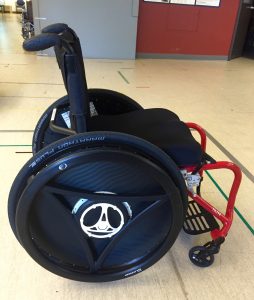
Manual wheelchairs are often prescribed to increase the independent mobility of individuals who are unable to walk. Conventional wheelchairs are operated by forward propulsion. However, this hand-rim propulsion style has been shown by numerous studies to be mechanically ineffecient. Rowheels are novel wheelchair wheels that allow the wheelchair user to pull backwards to move forward. The theoretical benefit of these wheels is that they allow the user to utilize larger back and shoulder muscle groups compared to conventional wheeling, which uses primarily the front smaller shoulder muscles. It is anticipated that reverse wheelchair propulsion will require greater energy output, facilitating greater mechanical efficiency. Additionally, it is anticipated that the new design will reduce excessive fatigue and upper extremity discomfort.
 The purpose of this study is to compare energy expenditure of forward versus reverse wheelchair propulsion. This will be done by measuring energy consumption during submaximal exercise tests. Rowheels, the reverse hand rim wheelchair wheels design and a conventional hand-rim propelled wheelchair will be tested and compared. There will be a total of 3 test conditions in this study. One wheelchairs fitted with 2 kinds of Rowheels and the standard hand rim wheelchair.
The purpose of this study is to compare energy expenditure of forward versus reverse wheelchair propulsion. This will be done by measuring energy consumption during submaximal exercise tests. Rowheels, the reverse hand rim wheelchair wheels design and a conventional hand-rim propelled wheelchair will be tested and compared. There will be a total of 3 test conditions in this study. One wheelchairs fitted with 2 kinds of Rowheels and the standard hand rim wheelchair.
Why should you participate in this study?
Participants will have the opportunity of testing a new technology of wheelchair. The results will assist in providing a better understanding of the effect of wheelchair designs on wheeling efficiency for those who use wheelchairs on a daily basis.
You may be able to participate if you
- Able-bodied males between 19 and 65 years old
- No previous experience using a manual wheelchair
- The physical endurance operate a manual wheelchair without pain
- PAR-Q readiness to participate in physical activity
- Able to read, write and speak English
- Able to give their own consent
You may not be able to participate in this study if you
- Have cardiac illness
- Have Musculoskeletal issues in the upper extremities (e.g. injury or pain) that interfere with ability to use a manual wheelchair
- Smoke or have respiratory illnesses (i.e. asthma)
- Are unable to communicate in English
- Have a resting blood pressure over 140/90mmHg
Time commitment
1 visit (approximately 2.5 hours). The study will be held at ICORD (Blusson Spinal Cord Centre at 818 West 10th Avenue).
Compensation for participation
Participants will have the opportunity to test out a novel wheelchair propulsion system while contributing to the advancement of scientific research.
For more information or to sign up to participate:
Please contact the study coordinator, Laura Sanches Rocha, by email or call 604-715-4767

